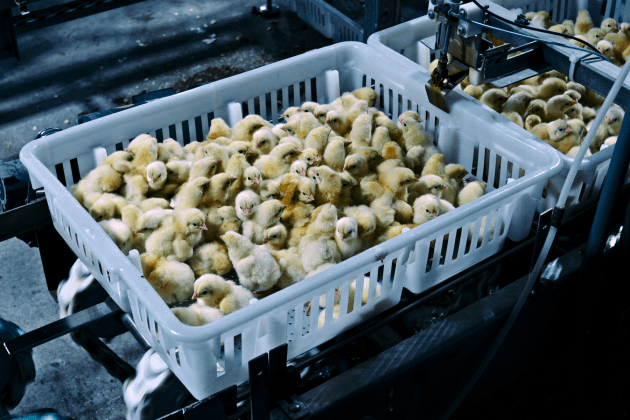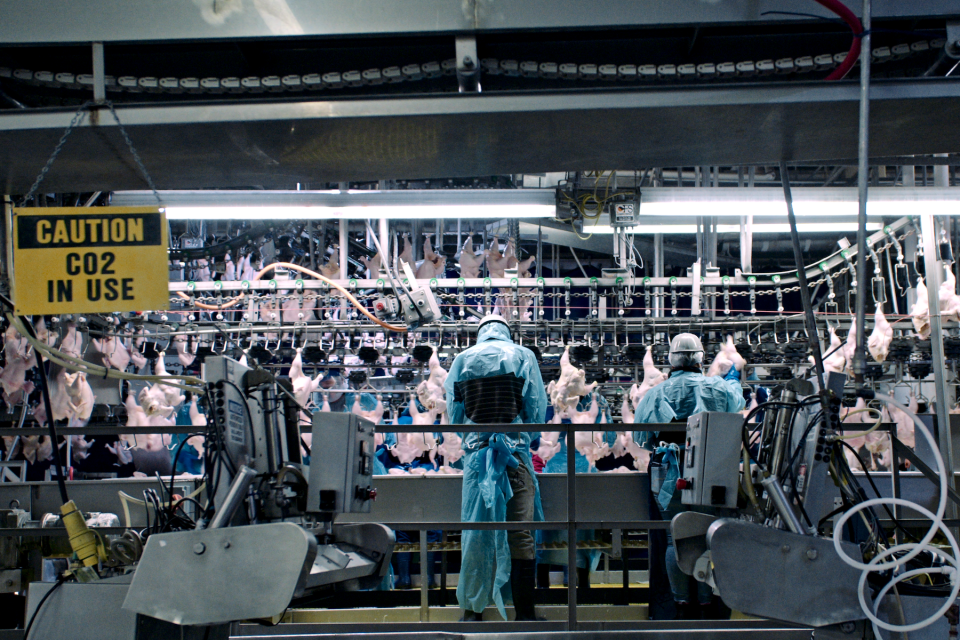Netflix Doc ‘Poisoned’ Reveals How Shockingly Dirty Your Food Is

So you’re hungry, and you want to eat something healthy. Maybe a salad. Whoops. Romaine lettuce and spinach are prolific carriers of foodborne pathogens (a 2006 baby spinach contamination led to a severe E. coli outbreak). OK, so maybe a chicken sandwich. Not so fast: It remains industry practice to sell raw chicken infected by salmonella. How about a wholesome peanut butter sandwich? Well, peanuts, too, have a bad salmonella history.
Such is the hazard of watching Poisoned: The Dirty Truth About Your Food, a sobering new Netflix documentary that makes eternal fasting seem like a really good option. Fastidious, even-keeled and concerning, it’s an alarming reminder to watch what you eat, at least if you want to stick around and stay healthy. Directed by Stephanie Soechtig, who previously examined America’s obesity epidemic in the documentary Fed Up, and based on the book by ace narrative journalist Jeff Benedict, Poisoned favors reporting and analysis over shock emotional appeal, although there’s plenty to get angry about here. The film brings into sharp focus issues that linger at the periphery of the national consciousness, inconvenient truths about the dangers inherent to what we eat, and the negligence of those responsible for regulation. It’s the story of a broken system that often places profit over public health and safety.
More from Rolling Stone
'Heartstopper' Season 2 Captures the Beauty of Queer Teen Love
Madonna Reflects on Health, Thanks Supporters: 'I Realized How Lucky I Am to Be Alive'
Descendents' Milo Aukerman Recovering From Surgery After 'Mild Heart Attack'
Poisoned takes its place in a tradition that includes The Jungle, Upton Sinclair’s muckraking 1906 exposé of the meatpacking industry, and Fast Food Nation, Eric Schlosser’s 2001 nonfiction book — first serialized in the pages of Rolling Stone — that was adapted into a narrative feature film directed by Richard Linklater. The fast food connection is pertinent: Poisoned opens with the E. coli outbreak that killed four children who ate contaminated Jack in the Box burgers in 1992 and 1993. The fallout led to landmark regulation that improved fast food safety, but Poisoned makes the case that much of the food industry has lagged woefully behind.
The film speaks truth to power, quite literally when Soechtig puts corporate executives and government regulators on camera to tap-dance their way around pointed questions and carefully recorded data. “Sometimes the manufacturers of food don’t think of it as food,” explains the attorney Bill Marler, who has made it his life’s mission to hold the food industry’s feet to the fire. “It becomes a commodity.” If Poisoned has a protagonist it is Marler, an unflappable, roll-up-the-sleeves sort who began his journey by representing one of the young victims in the Jack in the Box outbreak. An honorable mention goes to Kenneth Kendrick, a former Peanut Corporation of America plant manager who blew the whistle on his boss, PCA owner Stewart Parnell, when he learned Parnell knowingly altered inspection records and shipped out contaminated nuts. In 2014, Parnell was convicted of conspiracy, mail and wire fraud and the sale of misbranded food, and sentenced to 28 years in federal prison.

At the heart of Poisoned is an age-old conflict between public health and safety and corporate greed. Food lobbyists throw money around freely and hold powerful sway over the politicians who might bring about regulatory change. In some instances, the industry funds the research of scientists who then become political appointees and go about making life easier for the industry. It’s an unholy, unhealthy circle that keeps spinning even as politicians repeat, ad nauseum, that the U.S. has “the safest food supply in the world.” (Breaking: It doesn’t). Why do produce farms set up shop near cattle farms and feed lots? Because it would be expensive to make changes. Meanwhile, cow poop makes its way into irrigation canals, bringing contaminants directly to the water used to keep the produce alive. And so it goes.
Netflix shows its share of quick-and-dirty docs, overheated clip jobs that serve sensationalist ends. Sometimes, however, the streamer brings to light thoughtful and carefully crafted works that want you to think. Poisoned lands firmly in the latter category. It benefits from an appropriately pensive but dramatic score, composed by Justin Melland, and evocative cinematography from Rod Hassler. One oddly lyrical sequence, shot at a Perdue chicken hatchery, shows newly hatched chicks as they’re sifted and sorted en route to the farm. It’s almost enough to make you swear off meat – for a moment, anyway. As Poisoned reminds us, there’s a fair amount of cognitive dissonance involved in what and how we eat. The food industry knows how much we’re willing to overlook and forget for the sake of ease and expedience. Films like Poisoned make it a lot harder to keep whistling in the dark.
Best of Rolling Stone

